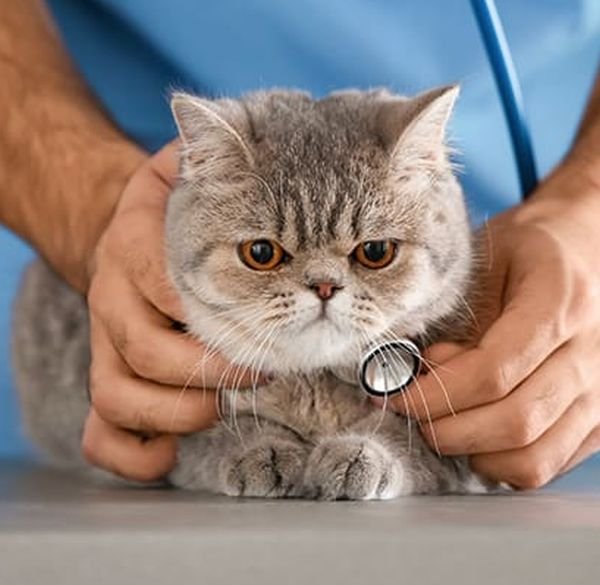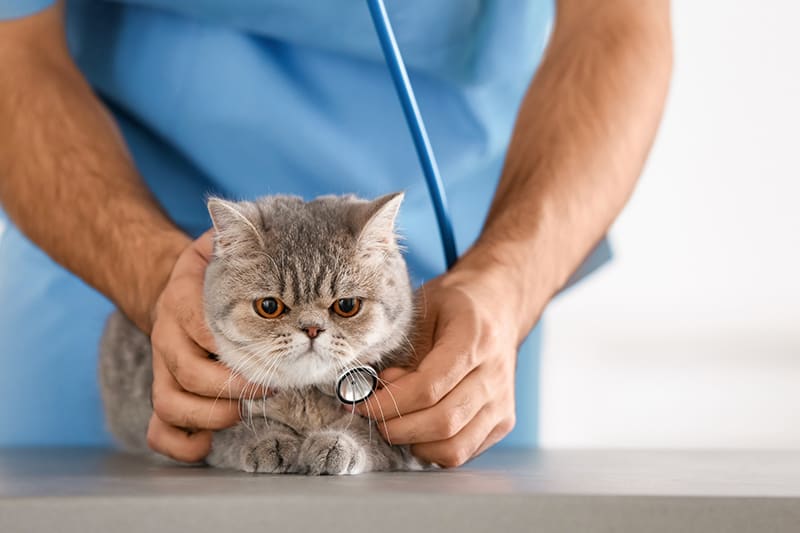
Is your cat not peeing? Does the urine look abnormal? These may be signs of many types of urinary tract disease.
Urinary issues are all too common in cats. Urinary tract infections affect both male and female cats, while urinary blockages effect primarily male cats. Issues can also be caused by seemingly no reason at all, called Feline Idiopathic Urinary Tract Disease.
Average Cost of Urinary Tract Treatment
Simple urinary tract infections can be treated with one or two visits to the veterinarian. This will cost $200 to $500, depending on how extensive the diagnostics and treatments are.
On the other hand, urinary blockages need emergency attention and surgery. Types of urinary crystals in the bladder may also need surgery.
For feline urethral obstruction (urinary blockage) and feline uroliths (bladder crystals/stones) costs include diagnostics, medical treatment, and surgery. You can expect to pay $800 to $2,200. The price mainly varies based on the severity and urgency of the case.
- Symptoms and Examination
Inappropriate urination, crying in the litter box, frequent urination, and blood in the urine are all symptoms of urinary issues in cats. Most cases of inappropriate urination in cats begin as a urinary tract infection.
Therefore, they should be quickly investigated by your veterinarian. An exam of this nature will cost $50 to $100.
If your cat is ever unable to urinate, this is an emergency. Even waiting overnight can result in kidney damage and death. If an emergency clinic is needed, the exam cost is $100 to $300 depending on your location.
- Diagnosis
When urinary issues are suspected, your veterinarian will do a urinalysis. This test will look for any crystal formation and bacteria in the urine as well as kidney issues.
The cost of a urinalysis is $60 to $120. This may or may not include a urine culture. A urine culture alone is about $40. If your veterinarian has to collect a urine sample directly from the bladder, this will increase the urinalysis price by about $30.
If crystal formation is suspected or a urinary blockage has occurred, an x-ray will also be recommended. An x-ray costs $120 to $250.
This will confirm the presence and size of any urinary crystals/stones. This is especially important in male cats as crystals can cause a blockage.
For blood tests, CBC might be needed which costs around $50 to $60. Some vet clinics offer a package inclusive of the complete blood count and chemistry panel for $150 to $200.
If a full chemistry panel is out of your price range, your veterinarian may recommend some limited testing such as electrolyte test. This test is priced around $20 but will give much less information.
Ultrasound that costs roughly $300 would also be a possibility.
- Non-Surgical Treatment
Your veterinarian will decide if the urinary issues can be addressed with medication or if surgery is required. It would be extremely rare for female cats to need surgery.
Antibiotics will cost $20 to $70 depending on the kind recommended by your veterinarian. Anti-inflammatory pain medication is also typically prescribed, which costs around $30. Subcutaneous fluids may also be needed, which cost $15 to $30.
If struvite crystals are present, your cat will need to be placed on a prescription diet to dissolve them. A 4-pound bag of this cat special diet costs around $25 while 24 cans cost around $40.
Canned food is preferred over dry as it increases water intake and helps dissolve the crystals faster. Your cat may need to stay on this food for life if it is prone to crystal formation.
- Surgical Treatment
Treatment costs will rise rapidly if surgery is needed. Cats with a urinary blockage will need emergency surgery.
Non-blocked cats with urinary crystals will need surgery rapidly as well, but it can usually wait until normal business hours. Cats that need surgery will still need all the medical treatments listed above in addition to the surgical treatments.

The Surgical Procedure
- Pre-Surgery Health Checks
Most cats will require bloodwork before going under anesthesia. As mentioned above, full blood chemistry and CBC costs around $150 to $200.
These tests will show which medications and precautions to use during the surgery. They also will give insight into any kidney damage that may have occurred.
If the surgery is not done the same day as the diagnosis, the veterinarian will do another exam before administering anesthesia. This exam costs $30 to $50 and makes sure your cat’s condition hasn’t changed much since diagnosis.
- Anesthesia and Surgery
The amount of anesthesia required will vary depending on the type of surgery.
The best-case scenario is that your cat only requires flushing of the urinary tract. A catheter will be placed to dislodge any crystals and the bladder will be flushed. This only requires a reversible anesthetic injection which costs $25 to $50.
The catheter will stay in place for up to three days until the inflammation is reduced. The procedure itself should cost $100 to $200.
If abdominal surgery is required to remove crystals, your cat will need anesthetic gas as well as an anesthetic injection. This will bring the cost of anesthesia into the $150 to $200 range. This is not only due to the added drug cost, but the close monitoring of vital signs required as well.
The veterinarian will go into the abdomen and directly into the bladder to remove the sediment. This is required when crystals are large or numerous. The price for the procedure will likely be in the $200 to $400 range.
Nephrectomy for the irreversible complications to the kidney and ureter may be required if the cat has failed to be treated earlier. This operation is rare in cats and will cost significantly more than other urinary surgeries.
To make sure that the best surgical practices are used, find an American Animal Hospital Association (AAHA) accredited veterinary clinic. Accredited clinics are not usually more expensive than non-accredited.
Do not be afraid to ask your veterinarian for a referral to a specialist. This can be at a veterinary school or a specialty hospital. Many times, the cost of surgery at a specialist is comparable to your local veterinarian.
- Surgical Recovery
Often, hospitalization is required after a catheter is placed. Post-op hospitalization will cost $50 to $100 per day and usually lasts up to 3 days.
In addition to the drugs listed previously, your cat will be given and sent home with strong pain medication that costs $50 to $100. It may also need an Elizabethan collar to prevent any licking, which costs $10 to $20.
In some cases, your veterinarian may recommend sending out the bladder stones for analysis by a laboratory. This will tell your veterinarian what type of stones your cat has and how best to prevent them in the future. This test costs around $100.
- Follow Up
For a simple urinary tract infection, it is a good idea to follow up with a urinalysis to make sure the infection is cleared.
For a case of urinary crystals, your veterinarian will want to see that the prescription food has dissolved any crystals and prevented any new ones from forming. They will also want to check that your cat is healing well if they had surgery. This may involve x-rays, bloodwork, and urinalysis.
Overall, the follow up can cost as low as $50 for a simple urinary tract infection to $400 for an extensive recheck.

All US veterinarians are real psychopaths and those who work for corporations are also gangsters.
The only thing that is very pleasing is that, according to statistics, people in this profession have a very high suicide rate. So many people would like this suicide rate among corporate veterinarians to at least double or even triple.
Very helpful, thank you!
Unfortunately and sadly those over the roof prices prevent owners to properly take care of their cats in case of urinary blockage.